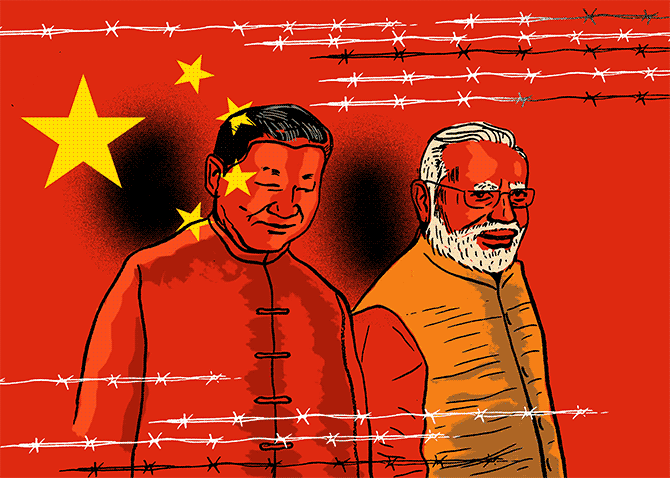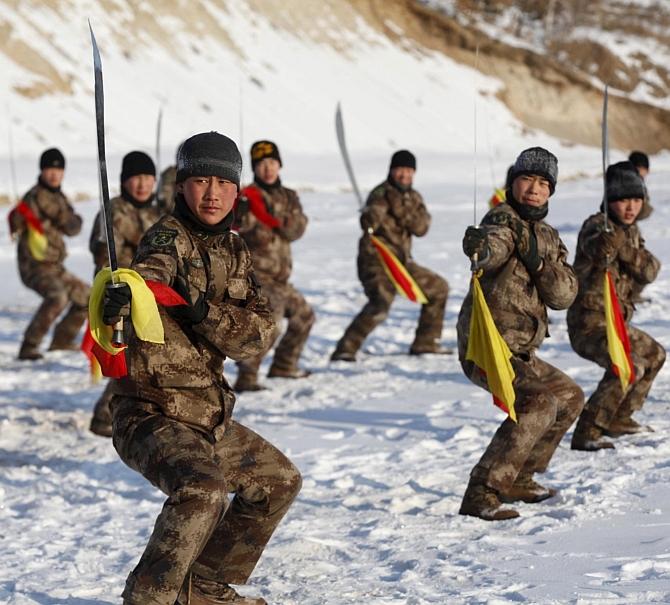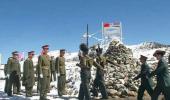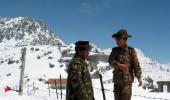'It is time we Indians stop our internal bickering and present a united front to Chinese machinations,' advises Colonel Anil A Athale (retd).

As a member of the war history division at the ministry of defence under the late Dr S N Prasad, I studied the 1962 India-China border conflict.
There were two questions that intrigued me then (and are not fully answered to date). First was the question as to why, despite obvious advantages, India did not use offensive air support?
In a first, with Air Commodore O P Sharma, we studied this issue. Luckily, many of the decision makers of that time were still available and were interviewed by us.
The result was, for the first time ever this crucial question was raised. Subsequently, many jumped on this bandwagon and posed as if a 'new' discovery was being made, the point remains that this was the first and the only authentic study of this big 'IF' of our recent history.
The conclusion was that in the personality oriented decisions of that era, this was not given the serious thought it deserved.
We thus lost a great opportunity to use our strength and turn the tide in the 1962 conflict.
The second crucial question about that conflict was why did the Chinese attack on October 20, 1962?
The timing was intriguing as ideally the 'planned' attack should take place in July-August, giving sufficient time before the winter snows block the passes!
Suspicion about the timing also arose due to the fact that tensions on that border were rampant since December 1960.
As I studied the 1962 conflict from 1987 to 1991 as a part of the ministry of defence's war studies division, I was also simultaneously working on my PhD.
As a part of the study of security dimension of South Asia (my topic for the doctorate) I read extensively on the Cuban missile crisis of October 1962.
This brought to my notice a remarkable coincidence about the events on the India Tibet border and the course of events of the Cuban missile crisis.
Was it a coincidence that the Chinese attack on India on October 20, 1962 was timed exactly at the same time as the Americans imposed a blockade on Cuba?
The Cuban missile crisis did not end by November 2 when the then Soviet Union agreed to dismantle the missile bases.
The second flash point came when the US discovered that Cuba was assembling Illushin 24 bombers! The standoff finally ended only on November 20, 1962 when the bomber issue was resolved.
The Chinese declaration of a 'unilateral cease fire' on November 21, 1962 came in just a day after the Cuban missile crisis was resolved and the US under then President John F Kennedy alerted American strategic bombers in the Philippines to come to India's help.

Underlying the Chinese actions of October/November 1962 was a shrewd calculation that engaged in a struggle with the USSR, the US was not likely to act on its implicit guarantee to come to India's help in case of a Chinese attack.
I found enough evidence of this US 'policy' in the Kennedy archives and it finds mention in Thomas Schelling's classic work Arms and Influence as well (page 51).
Another Chinese calculation, made explicit by Mao Zedong, was that in case of a nuclear war, both the US and the Soviet Union would suffer heavy damage and China would emerge as the strongest power.
In international relations there are no coincidences and events follow a planned sequence of action.
The reason to remember the events of 1962 amidst the 2020 pandemic is that like in 1962, China appears to be preparing to take advantage of the global situation to achieve its long term territorial ambition.
China has already upped the ante in the South China Sea. Its actions on the India-China border seem to follow the Cuban missile crisis logic.
China sees in the pandemic an opportunity as the West is battered economically and will have no stomach to confront China militarily.
The major Western power, the United States, is led by an eccentric leader who is at war with his own government.
The reason to raise these concerns is that India has historically been an inward looking country that fails to appreciate global threats.
When Islam had risen in Arab lands and went on to conquer Persia, the rulers in Delhi were fast asleep.
There was no attempt to strengthen the defences of the north western passes to stop potential invasions.
Even later, in our struggle with the English, the Indian rulers, with the notable exception of Tipu Sultan, were unaware of the English troubles in America in the 1770s.
Indians seem to have lapsed into their usual bickering ways even before one could spell 'pandemic'.
What else is one to make of the politics being played over the reverse migration that has been prompted by the lockdown and the natural desire of the migrants to return to their villages?
China seems hell bent to take advantage of world anarchy and advance its long held territorial claims.
China perceives that the window is only till January when (hopefully) the US returns to sane leadership and again begins to assert its military power.
It is time we Indians stop our internal bickering and present a united front to Chinese machinations.
The responsibility to forge a national consensus is on both the ruling party as well as the Opposition.
Else, an assertive China may well be tempted to make Arunachal Pradesh Southern Tibet!
Colonel Anil A Athale (retd), military historian and strategic thinker, is the co-author of the official history of the India-China conflict of 1962.
Production: Rajesh Alva/Rediff.com










